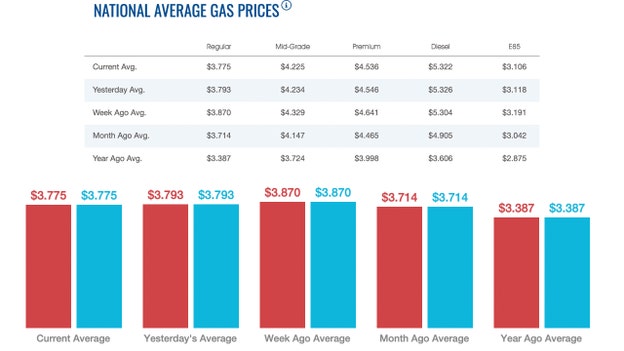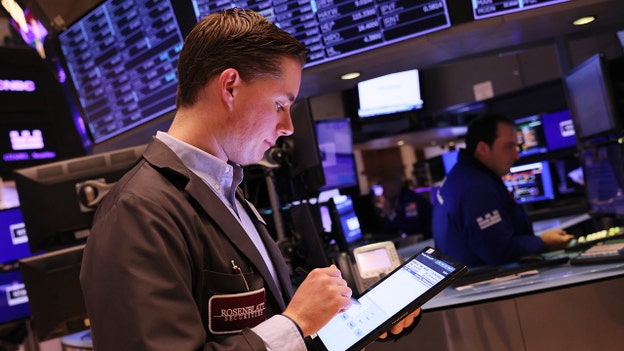STOCK MARKET NEWS: Nasdaq leads stocks, Microsoft, Google post mixed earnings, Powerball nears $700
Investors digest GM and Coke earnings as well as mixed quarters from Microsoft and Google. FOX Business is providing real-time updates on the markets, commodities and all the most active stocks on the move.
Coverage for this event has ended.
Google parent Alphabet saw revenues grow 6% to $69.1 billion but the tally fell short of Wall Street estimates. The growth was the slowest since 2020 as reported by Dow Jones.
Sundar Pichai, CEO of Alphabet and Google, said: “We’re sharpening our focus on a clear set of product and business priorities. Product announcements we’ve made in just the past month alone have shown that very clearly, including significant improvements to both Search and Cloud, powered by AI, and new ways to monetize YouTube Shorts. We are focused on both investing responsibly for the long term and being responsive to the economic environment.”
Software giant Microsoft reported revenue of $50.12 billion, higher than the same-period a year ago and besting Wall Street estimates of $49.6 billion.
Profits, however, fell short coming in at $2.35 per share or $17.56 billion, less than $20.51 a year-ago and short of Wall Street's $2.71 per share target.
“In a world facing increasing headwinds, digital technology is the ultimate tailwind,” said Satya Nadella, chairman and chief executive officer of Microsoft in the company's release.
U.S. stocks rallied across the board with material and communication stocks leading a broad advance for the S&P 500 as earnings roll in. The 10-year Treasury yield pulled back to 4.109%. In commodities, oil rose 0.8% to $85.32 per barrel.
Elon Musk, the world's richest man, who is looking to make Twitter an even playing field of free speech is promising his deal will be confirmed by Friday.
U.S. stocks rallied on positive earnings from GM, Coke and ahead of results from Microsoft and Google due after the bell. In commodities, oil rose to the $85 per barrel level.
| Symbol | Price | Change | %Change |
|---|---|---|---|
| GM | $35.95 | 0.23 | 0.64 |
| KO | $58.09 | 0.52 | 0.90 |
| MSFT | $247.23 | -0.02 | -0.01 |
| GOOGL | $103.00 | 0.48 | 0.47 |
Retail giant Adidas terminated its partnership with rapper Ye, formerly known as Kanye West, following his recent anti-semitic remarks.
Cryptocurrency prices for Ethereum and Dogecoin were higher, while Bitcon prices turned lower early Tuesday.
At approximately 5:30 a.m. ET, Bitcoin was trading at nearly $19,278 (-0.27%), or lower by $54.For the week, Bitcoin was trading lower by nearly 1.2%. For the month, the cryptocurrency was higher by nearly 2.05%.
Ethereum was trading at approximately $1,346.8 (+0.25%), or higher by more than $2.90.For the week, Ethereum was trading higher by almost 0.7%. For the month, it was trading higher by approximately 1.9%.
Dogecoin was trading at $0.059776 (+0.72%), or higher by approximately $0.000427.
For the week, Dogecoin was lower by nearly 1.25%. For the month, however, the crypto was lower by more than 6.37%.
Gas prices nationwide dropped nearly 2 cents early Tuesday morning, continuing the trend for the last week, according to AAA.
The price of a gallon of gasoline early Tuesday was $3.775 down from Monday’s was $3.793. On Sunday, that same gallon of gasoline cost $3.796 nationwide.
One week ago a gallon of gasoline cost $3.87 One month ago, that same gallon of gasoline cost $3.714 nationwide. One year ago, a gallon of gasoline cost $3.387 per gallon.
Gas hit an all-time high on June 14 of $5.06 per gallon nationwide, approximately 19 weeks ago.
Meanwhile, the price a gallon of diesel fell for the second straight day to $5.322, a drop from Monday’s $5.326. Sunday’s price was $5.332.
One week ago, a gallon of diesel cost $5.304, while a month ago, the cost was $4.905. One year ago, a gallon of diesel nationwide sold for 3.606.
| Symbol | Price | Change | %Change |
|---|---|---|---|
| I:DJI | $31,499.62 | 417.06 | 1.34 |
| SP500 | $3,797.34 | 44.59 | 1.19 |
| I:COMP | $10,952.61 | 92.90 | 0.86 |
US stocks turned lower early Tuesday after staying in positive territory throughout much of the overnight.
Stocks gained on Monday as investors focused on encouraging signs from corporate earnings and hopes that the Federal Reserve would slow the pace of interest-rate increases.
The Dow Jones Industrial Average climbed 417.06 points, or 1.3%, to 31499.62, its highest closing level in six weeks. The S&P 500 advanced 44.59, or 1.2%, to 3797.34. The technology-heavy Nasdaq Composite rose 92.90, or 0.9%, to 10952.61, bouncing back after it started the day in the red.
Last week, the Dow notched its best three-week stretch since November 2020, offering investors a reprieve from the selling pressure that has whipsawed portfolios this year.
The rally was kicked off, in part, by a batch of corporate earnings -- particularly from banks and airlines -- that offered an encouraging outlook on the U.S. economy.
Stocks then raced higher on Friday after The Wall Street Journal reported that Fed officials are likely to consider the possibility of shifting to smaller interest-rate increases in December.
"Market participants are desperately looking for a Fed pause or pivot," said Chris Senyek, chief investment strategist at Wolfe Research. Still, he cautioned that such hopes would likely be dashed by continuing high inflation and low unemployment, which would pressure the central bank to maintain its hawkish stance.
"We think a Fed pause is a long ways off," Senyek said.
Meanwhile, shares were mostly lower Tuesday in Asia as markets remained jittery over the outcome of a Communist Party congress in China, where key reformers were excluded from the highest ranks of ruling party leadership.
Hong Kong’s benchmark failed to hold onto early gains after a 6.4% selloff the day before that took it to its lowest close in over a decade.
Tokyo and Sydney advanced but Shanghai, Seoul and Mumbai declined. Hong Kong's Hang Seng lost 0.2% to 15,151.01 and the Shanghai Composite index also shed earlier gains, slipping 0.1% to 2,975.08. Taiwan's benchmark fell 1.5%. Tokyo's Nikkei 225 index rose 1.2% to 27,301.50 while the Kospi in Seoul lost 0.1%, to 2,235.07. Australia's S&P/ASX 200 gained 0.3% to 6,798.60. India's Sensex slipped 0.3%.
| Symbol | Price | Change | %Change |
|---|---|---|---|
| USO | $70.38 | -0.19 | -0.27 |
| CVX | $173.13 | -0.06 | -0.03 |
| XOM | $106.60 | 0.74 | 0.70 |
Oil prices rose on Tuesday as the U.S. dollar eased against major peers but gains were limited by worries of slowing global fuel demand growth amid bearish economic data from key oil importing economies such as China.
International benchmark Brent crude futures gained 3 cents to $93.29 per barrel by 0652 GMT, after falling 0.3% in the previous session.
U.S. West Texas Intermediate crude futures for December delivery rose 11 cents to $84.69 per barrel, after a previous decline of 0.6%.
A weaker U.S. dollar makes dollar-denominated oil less expensive for other currency holders and helps push prices higher. However, signs of uncertain economic activity in the United States and China, the world's two biggest oil consumers, limited the increase.
"The intraday price swings aside, Brent and WTI futures are stuck in a relatively narrow band since Thursday," said Vandana Hari, founder of oil market analysis provider Vanda Insights.
Supply and demand fundamentals remain largely stable, leaving economic sentiment at the centre-stage for the oil market, Hari added. "Much of the souring outlook on demand has already been baked in, so any further downward pressure may be slow-acting," she said.
Also on Monday, government data showed China's crude oil imports in September were 2% lower than a year earlier, continuing a trend of lower imports at the same time it reported slowing retail sales.
U.S. crude oil inventories are also expected to rise this week, which may limit price gains. Analysts polled by Reuters estimated on average that crude inventories rose by 200,000 barrels in the week to Oct. 21.
Analysts estimated stockpiles of gasoline fell by about 1.2 million barrels and distillate inventories, which include diesel and heating oil, were expected to have dropped by 1.1 million barrels last week.
Separately, International Energy Agency head Fatih Birol said on Tuesday the world will still need Russian oil to flow to the market despite a price cap, with between 80% to 90% an "encouraging level" to meet demand. Many details of a price cap on Russian oil still have to be ironed out, Birol said during the Singapore International Energy Week.
Live Coverage begins here









